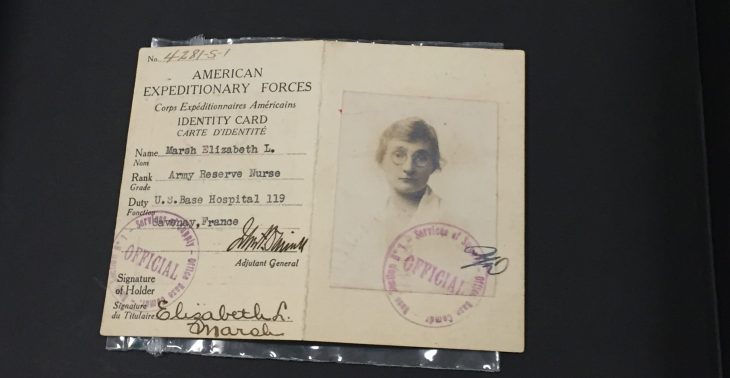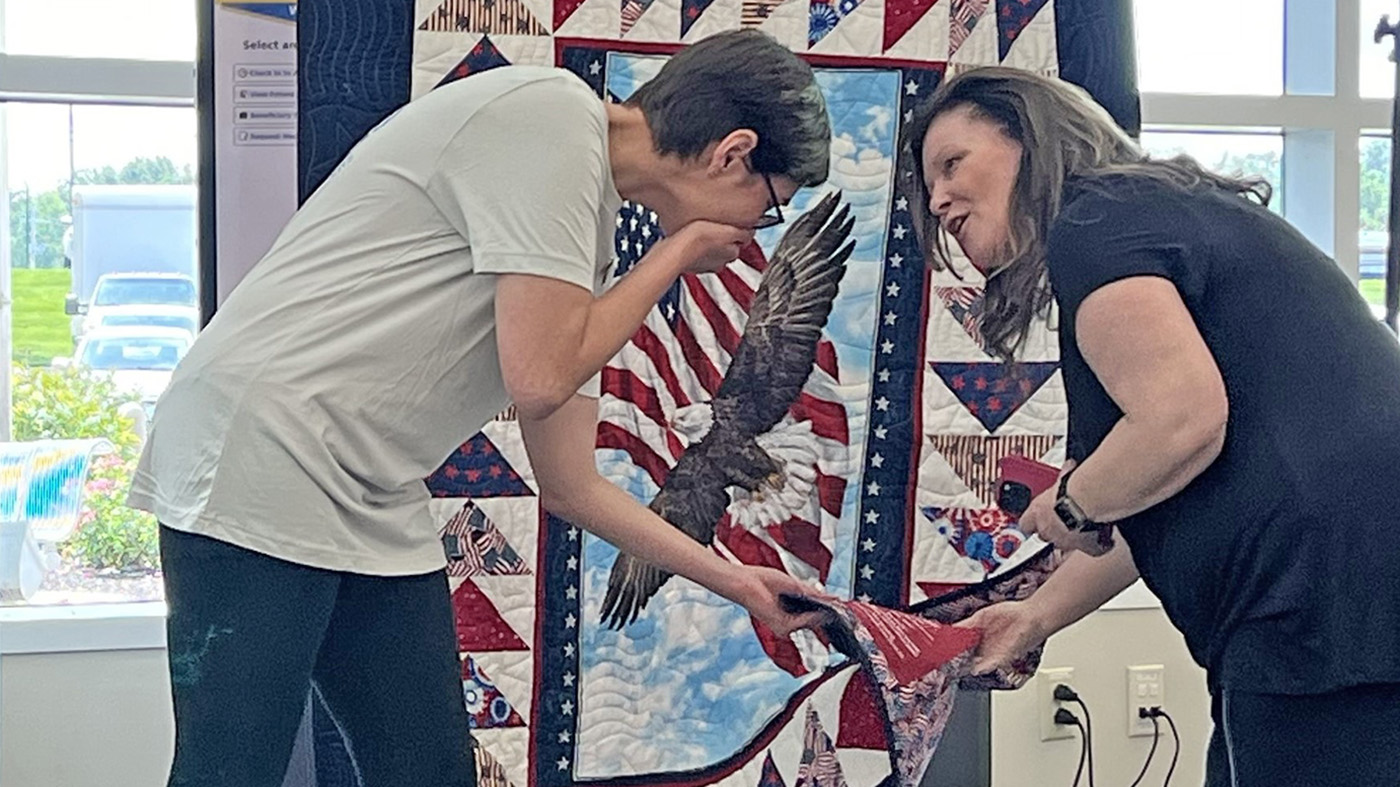Put a bunch of women Veterans in a room, give them a mission to accomplish, and something almost magical ends up happening. I’ve seen this over and over in women-Veterans-only writing workshops. And it happened in each of the four weekend sessions of the program “100 Years of Women at War,” a National Endowment for the Humanities-sponsored program presented by staff from the Smithsonian National Museum of American History and the University of Maryland School of Public Health.
At each of the four workshops, more than a dozen women Veterans – active duty, Reserve, and Guard; officer and enlisted; and one courageous male spouse – engaged with documents and artifacts from women who served in World War I and women who served in the most recent conflicts in Iraq and Afghanistan. We read memoirs and diaries, examined photos and artifacts from the museum collections, listened to expert speakers, and wrote reflectively about their experiences and our own. Most importantly, though, we connected.

Sixteen of us were packed into a cramped storage room at the Smithsonian. Several uniforms had been mounted on mannequins in preparation for an upcoming exhibit; others were laid out on steel tables for examination as if we were biology students conducting a dissection. One table held Representative Martha McSally’s government-issue abaya: the stiff black fabric seemed to radiate malevolence, even though it was trimmed in delicate black embroidery. Our guides – historians and museum curators – explained various items from the First World War: a barely-yellowed Navy nurse’s uniform; tiny-waisted, military-cut jackets and straight wool skirts worn by Red Cross volunteers; medical implements, ID cards, and sepia-tinted photographs of uniformed women wearing hats so wide-brimmed that we wondered how they kept from whacking the hats of the women beside them in formation.
One woman pointed to the boots. “Imagine!” she said. “It must have been so hard to work a sixteen-hour shift on your feet all day in boots like those!”
Suddenly the dam broke. Stories flew. Several women who had deployed to Iraq and Afghanistan remembered how armor cut for men – when they were issued armor at all – chafed delicate skin and didn’t protect their vital areas. Another remembered how, 30 years earlier, the Army had retired women’s striped seersucker summer uniforms and replaced them with less comfortable and attractive greens. We laughed over some of our male colleagues’ strange misconceptions about women’s hygiene in the field. We seethed with resentment when we remembered how women had been expected to police the uniforms of women we didn’t even supervise, as if men couldn’t bother to be held responsible for knowing women’s grooming standards. Some women shared stories of harassment and abuse; others, of brothers-in-arms who had been mentors and friends.
In the second session, two months later, four women Veterans trained as facilitators led us in discussing several books from both time periods. The conversations ranged from the changes in women’s status in America to the difficulties of managing a military career and a family. One Veteran brought many of the participants to tears when she shared a traumatic story from her time in the Army: she had told no one but immediate family for more than three decades. At the end of the day she said, “This program has helped me process things I didn’t even know I needed to process.”
The highlight of the program for many participants came in the third session, in March, when Major Lisa Jaster – the third woman to complete Army Ranger School and earn her Ranger tab – gave an interview and answered our questions about her experience. University of Richmond professor Laura Browder explained how she’d paired oral histories of 52 military women with their photographic portraits. Afterwards, participants completed a series of writing exercises around images of military women at various points in history. For some, the writing evoked long-buried feelings of anger. The theme of women Veterans’ invisibility – first as women in uniform, and then after our reintegration into civilian society – came up repeatedly.
In the final session earlier this month, a representative from the Library of Congress’ Veterans History Project and Browder explained how to collect Veterans’ oral histories and where to submit them. We examined an exhibit on military medicine in World War I and marveled at how far it has come in a hundred years. Kayla Williams shared her experiences with military and VA health care during her husband’s recovery from a traumatic brain injury. We looked at how the handful of black women who served in WWI – Navy yeomen (female) and Army nurses – had entered the military, and how their service had been understood by historians.
Many of the program participants, like me, had almost always been assigned as “one of one” – we’d been the only woman, or one of only a few women, at a command. We’d had few chances to meet our sisters-in-arms or to connect, especially socially. We hadn’t realized how much we’d missed; for many of us, the program was the first time we’d enjoyed the easy camaraderie that military men take for granted. We ended the program with reflections on finding our “tribe,” military sisterhood, and the connections that come from the shared experience of military service, across generations and even across a century. “This program has changed my life,” one participant said.
Dr. Marian Moser-Jones at the University of Maryland School of Public Health hopes to renew the grant that funded “100 Years of Women at War” for 2017-2018.
Program readings included:
- Mary Borden, The Forbidden Zone: A Nurse’s Impressions of the First World War.
- Laura Browder (with Sascha Pflaeging), When Janey Comes Marching Home: Portraits of Women Combat Veterans.
- Heidi Squier Kraft, Rule Number Two: Lessons I Learned in a Combat Hospital.
- Ellen LaMotte, The Backwash of War.
- Beatrice MacDonald, war scrapbook.
- Sarah Sand Stevenson, Lamp for a Soldier: The Touching Story of an American Nurse in World War I. (Out of print – may be available through local libraries.)
- Kayla Williams, Love My Rifle More Than You: Young and Female in the U.S. Army.
About the author: Jerri Bell is the Managing Editor for O-Dark-Thirty, the literary journal of the Veterans Writing Project. She retired from the Navy in 2008; her assignments included antisubmarine warfare in the Azores Islands, sea duty on USS Mount Whitney and HMS Sheffield, and attaché duty at the U.S. Embassy in Moscow, Russia. She and former Marine Tracy Crow are the co-authors of It’s My Country Too: Women’s Military Stories from the American Revolution to Afghanistan.
Topics in this story
More Stories
In its 7th year, the Salute to Women Veterans welcomed over 100 women Veterans for a morning of recognition.
This month’s Center for Women Veterans Book Corner author is Marine Corps Veteran Sarah B. Gray, who served as an administration clerk from 2001-2006. She wrote “Millie the Moose Blurts.”
Summer can be a joyful time of year, but some outdoor activities can be hard for some Veterans. In this guest post, former VA Secretary Bob McDonald shares resources and plans to navigate summer activities.







Happy Fathers day to my pa W.T. (Chug) Sumner. Rest in peace old man.
I was at the last session, and I enjoyed the experience tremendously. I was not in Vietnam, but I am a Vietnam Era veteran. I served in the USAF from 1967 to 1972, then in the USAF Reserves until 1993. I also represent a portion of the women in the Pennsylvania American Legion. I am a Deputy Commander in the 15th District, and my area of interest is women veterans issues. I talk to schools and groups about women veterans whenever I get the chance. I am also the Historian for my Post (Post 154, Montrose, PA) and I have started an effort to remember all of our stories, but particularly the women veterans. The seminar further encouraged my efforts. I thank them, and I challenge other women veterans to get involved. Janice Gavern, USAF and USAFRes, enlisted to Tsgt, officer to Captain, 1967 to 1993.Personnel Clerk, then Recip Engine Mechanic, Aircraft Maintenance Officer
Please consider a group of women veterans to include to be the ones who served during Korean, Vietnam, the Cold War, and Bosnia conflicts as well as all ERA’s. Good press for Women veterans shows all services in all ERA’s and will move us women veterans from Invisible to Visible. We all have important stories to tell and all should be considered. Thank you.
Jeanne Goldy-Sanitate, MS-OD, Proud USAF Women Veteran, 1976-1984 USAF Medical Service.